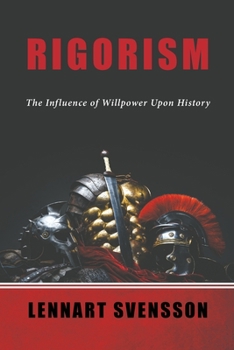Rigorism: The Influence of Willpower Upon History
In Rigorism: The Influence of Willpower Upon History, Lennart Svensson presents a unique interpretation of rigor that allows us to examine some of the gray areas in history. Svensson's concept of rigorism is derived from the Latin word rigor, which means hardness and discipline. This theory covers instances of willpower in history, such as acting decisively in a crisis and demonstrating responsibility with authority. It is an area of history that has been largely ignored until now, even though all historical figures have to rely on their willpower in times of crisis.
Rigorism: The Influence of Willpower Upon History examines regimes in Sparta, Macedonia, the Diadochi, the late Republic, and Imperial Rome. This is followed by studies of Faustian Era figures like Napoleon, Boulanger, and de Gaulle.
In addition, Svensson also presents other historical topics, such as cycles of war, the artistic interests of rulers, the role of temples, heroes of aviation, the Shogan, and Kautilya's Arthashastra.
Related Subjects
History




